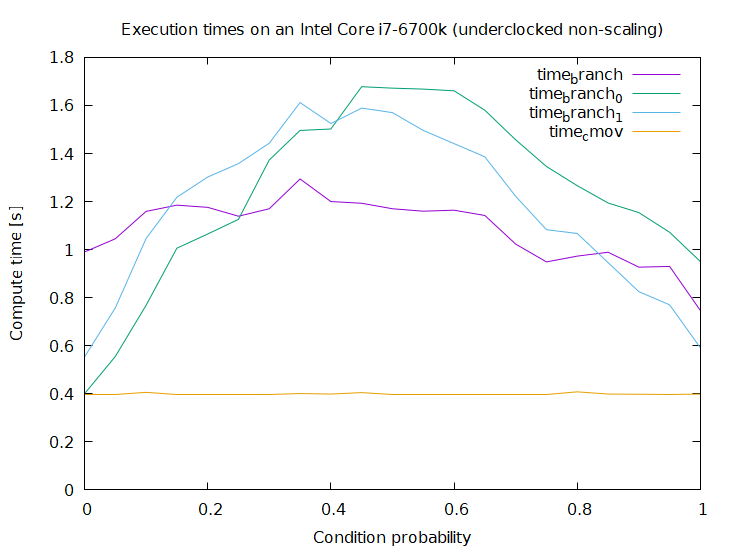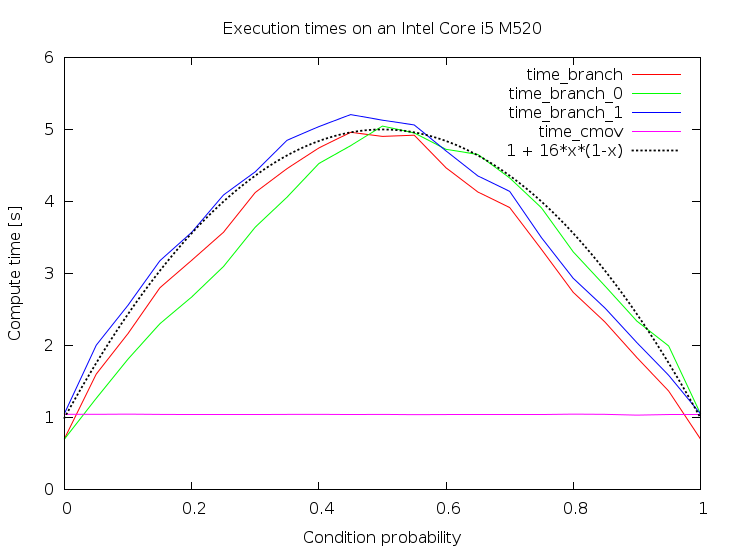Suppose you want to write the following code inside a performance critical loop:
if(cond) {
foo = bar;
}where foo is a local variable (of some simple type, like int),
and bar is either
a local variable, or a simple memory location (such as A[i]).
Such a code is likely to be found for example in a
Kadane's algorithm
implementation.
There are two standard ways for an x86-64 compiler to translate
this conditional into Intel assembly, namely a cmov
instruction, or a conditional branch paired with a regular mov.
To make this example more concrete I will focus on this particular code:
int j;
int res = 0;
for(j = 0; j < n; ++j) {
if(A[j]) {
res = j;
}
}GCC version 4.8.2 emits the following code for the if
at -O3 (gas' assembly notation):
movl (%rdi,%rcx,4), %r9d
testl %r9d, %r9d
cmovne %ecx, %eaxClearly the compiler stores the location of A in %rdi,
the value of j in %rcx (%ecx), and res in %rax (%eax).
We may however ask it to forget about the cmov instruction by
using the following command line parameters in addition to -O3:
-fno-tree-loop-if-convert
-fno-tree-loop-if-convert-stores
-fno-if-conversion
-fno-if-conversion2.
Then we will obtain the following assembly:
movl (%rdi,%rcx,4), %r9d
testl %r9d, %r9d
je .L4
movl %ecx, %eax
.L4:To make this example more interesting let's feed the compiler
with more data. GCC (and others probably too) implements
a mechanism allowing the programmer to specify that a condition
will likely/unlikely be true during the runtime. In our case
it would look like this (assuming that we are expecting
A[j] to be generally false):
int j;
int res = 0;
for(j = 0; j < n; ++j) {
if(__builtin_expect(A[j], 0)) {
res = j;
}
}The corresponding GCC output:
movl (%rdi,%rcx,4), %r9d
testl %r9d, %r9d
jne .L20
.L14:
/* Other code */
.L20:
movl %ecx, %eax
jmp .L14We are of course free to put 1 in the place of 0 whenever
we expect A[j] to be true most of the time:
int j;
int res = 0;
for(j = 0; j < n; ++j) {
if(__builtin_expect(A[j], 1)) {
res = j;
}
}And the corresponding GCC output (note the speculative
movl execution!):
movl %eax, %r8d
movl (%rdi,%rcx,4), %r10d
movl %ecx, %eax
testl %r10d, %r10d
je .L29
.L24:
/* Other code */
.L29:
movl %r8d, %eax
jmp .L24This way we obtain four versions of the program which I will call cmov, branch, branch_0 and branch_1. One might ask why there is no cmov_0 and no cmov_1, but it is due to the fact that in cmov's case the compiler ignored the likely/unlikely hints.
The point of this excercise is to measure their execution
speed, but this of course depends on the contents of
the A array. So let's fill it with random independent
identically distributed zeros and ones,
manipulating the probability of one (the probability
that the if's condition will be true).
Thanks to AndreasPK for providing this data.
On an i7-6700k (Skylake) cmov is now faster under all circumstances:

While the performance at the extremes looks the same cmov is still faster which becomes obvious when looking at the raw numbers:
0.000000;0.983000;0.412000;0.550000;0.411000
...
1.000000;0.747000;0.951000;0.591000;0.398000
branch_0 comes (very) close for probability zero but was still always slightly slower than cmov in 10 tests I ran.
These are the results I obtained on my machine. It is
the execution time, so the lower the better:

Three interesting facts can be read from this plot:
- The
cmovinstruction is generally faster. It is also immune to the probability - However the branch version is faster for stable, predictable conditions.
- The branch versions take approximately
p*(1-p)time to execute. The nice parabola-alike looks is approximately the variance of the distribution thatAwas sampled from.
The "visual proof" for the third fact:

To conclude, GCC emits cmov by default, and it seems like
a reasonable choice, at least on my Intel Core i5. However,
as noted before, it is not the optimal solution for stable,
predictable conditions.